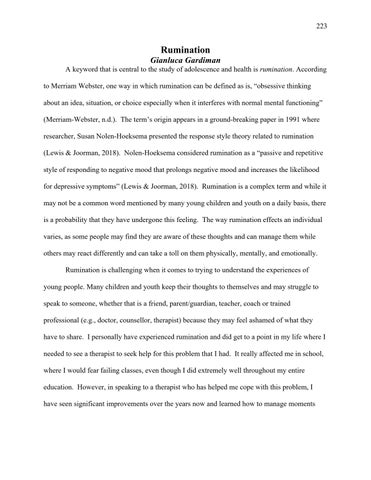223
Rumination Gianluca Gardiman A keyword that is central to the study of adolescence and health is rumination. According to Merriam Webster, one way in which rumination can be defined as is, “obsessive thinking about an idea, situation, or choice especially when it interferes with normal mental functioning” (Merriam-Webster, n.d.). The term’s origin appears in a ground-breaking paper in 1991 where researcher, Susan Nolen-Hoeksema presented the response style theory related to rumination (Lewis & Joorman, 2018). Nolen-Hoeksema considered rumination as a “passive and repetitive style of responding to negative mood that prolongs negative mood and increases the likelihood for depressive symptoms” (Lewis & Joorman, 2018). Rumination is a complex term and while it may not be a common word mentioned by many young children and youth on a daily basis, there is a probability that they have undergone this feeling. The way rumination effects an individual varies, as some people may find they are aware of these thoughts and can manage them while others may react differently and can take a toll on them physically, mentally, and emotionally. Rumination is challenging when it comes to trying to understand the experiences of young people. Many children and youth keep their thoughts to themselves and may struggle to speak to someone, whether that is a friend, parent/guardian, teacher, coach or trained professional (e.g., doctor, counsellor, therapist) because they may feel ashamed of what they have to share. I personally have experienced rumination and did get to a point in my life where I needed to see a therapist to seek help for this problem that I had. It really affected me in school, where I would fear failing classes, even though I did extremely well throughout my entire education. However, in speaking to a therapist who has helped me cope with this problem, I have seen significant improvements over the years now and learned how to manage moments
